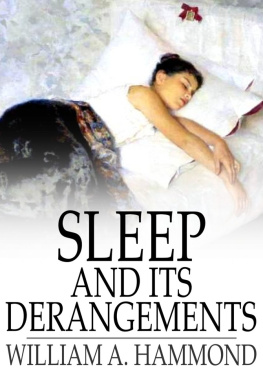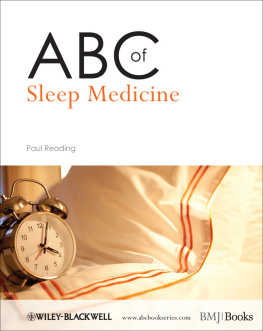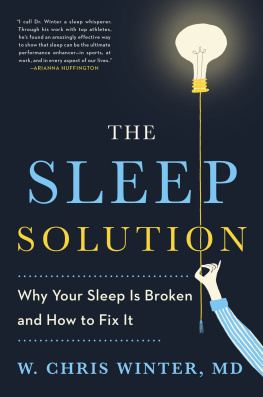SLEEP AND ITS DERANGEMENTS
* * *
WILLIAM A. HAMMOND

*
Sleep and Its Derangements
First published in 1869
Epub ISBN 978-1-77659-793-2
Also available:
PDF ISBN 978-1-77659-794-9
2014 The Floating Press and its licensors. All rights reserved.
While every effort has been used to ensure the accuracy and reliability of the information contained in The Floating Press edition of this book, The Floating Press does not assume liability or responsibility for any errors or omissions in this book. The Floating Press does not accept responsibility for loss suffered as a result of reliance upon the accuracy or currency of information contained in this book. Do not use while operating a motor vehicle or heavy equipment. Many suitcases look alike.
Visit www.thefloatingpress.com
Contents
*
Preface
*
The basis of this little volume is a paper on Insomnia, published in theNew York Medical Journal in May and June, 1865. This was subsequentlyenlarged and published in a separate form, under the title "Wakefulness,with an Introductory Chapter on the Physiology of Sleep."
The very favorable reception which it met with in this country, in GreatBritain, and on the Continent, from the medical press, the profession, andthe public generally, led to the exhaustion of a large edition in a fewmonths.
The present issue was announced nearly two years ago, and the printingbegun. Increasing professional duties have, however, prevented mebestowing that continuous labor upon it which was desirable, and hence thepublication has been long delayed. My apologies therefore are due, first,to my excellent and dear friend, the senior member of the house of J. B.Lippincott & Co., whose patience I know has been severely tried, but whohas scarcely reproached me for my neglect; and second, to that portion ofthe public which has been kind enough to make repeated inquiries relativeto the appearance of this monograph, and which I trust will not bedisappointed, now that it is really published.
162 WEST 34TH ST., NEW YORK,
July 10th, 1869.
Chapter I - The Necessity for Sleep
*
The state of general repose which accompanies sleep is of especial valueto the organism in allowing the nutrition of the nervous tissue to go onat a greater rate than its destructive metamorphosis. The same effect is,of course, produced upon the other structures of the body; but this is notof so much importance as regards them, for while we are awake they allobtain a not inconsiderable amount of rest. Even those actions which aremost continuous, such as respiration and the pulsation of the heart, havedistinct periods of suspension. Thus, after the contraction and dilatationof the auricles and ventricles of the heart, there is an interval duringwhich the organ is at rest. This amounts to one-fourth of the timerequisite to make one pulsation and begin another. During six hours of thetwenty-four the heart is, therefore, in a state of complete repose. If wedivide the respiratory act into three equal parts, one will be occupiedin inspiration, one in expiration, and the other by a period ofquiescence. During eight hours of the day, therefore, the muscles ofrespiration and the lungs are inactive. And so with the several glands.Each has its time for rest. And of the voluntary muscles, none, evenduring our most untiring waking moments, are kept in continued action.
But for the brain there is no rest, except during sleep, and even thiscondition is, as we all know, only one of comparative quietude in manyinstances. So long as an individual is awake, there is not a single secondof his life during which the brain is altogether inactive; and even whilehe is deprived by sleep of the power of volition, nearly every otherfaculty of the mind is capable of being exercised; and several of them, asthe imagination and memory, for instance, are sometimes carried to a pitchof exaltation not ordinarily reached by direct and voluntary efforts. Ifit were not for the fact that all parts of the brain are not in action atthe same time, and that thus some slight measure of repose is afforded, itwould probably be impossible for the organ to maintain itself in a stateof integrity.
During wakefulness therefore the brain is constantly in action, thoughthis action may be of such a character as not always to make us consciousof its performance. A great deal of the power of the brain is expended inthe continuance of functional operations necessary to our well-being.During sleep these are altogether arrested or else very materiallyretarded in force and frequency.
Many instances of what Dr. Carpenter very happily calls "unconsciouscerebration" will suggest themselves to the reader. We frequently findsuggestions occurring to us suddenlysuggestions which could only havearisen as the result of a train of ideas passing through our minds, but ofwhich we have been unconscious. This function of the brain continues insleep, but not with so much force as during wakefulness. The movements ofthe heart, of the inspiratory muscles, and of other organs which performeither dynamic or secretory functions are all rendered less active bysleep; and during this condition the nervous system generally obtains therepose which its ceaseless activity during our periods of wakefulness soimperatively demands. Sleep is thus necessary in order that the body, andespecially the brain and nervous system, may be renovated by the formationof new tissue to take the place of that which by use has lost its normalcharacteristics.
From what has been said it will be seen that the brain is no exception tothe law which prevails throughout the whole domain of organic naturethatuse causes decay. The following extract from another work bears uponthis point, and I think tends to its elucidation.
"During life the fluids and tissues of the body are constantly undergoingchange. New matter is deposited, and the old is removed with ceaselessactivity. The body may be regarded as a complex machine, in which the law,that force is only generated by decomposition, is fully carried out. Everymotion of the body, every pulsation of the heart, every thought whichemanates from the encephalon is accompanied by the destruction of acertain amount of tissue. As long as food is supplied in abundance, andthe assimilative functions are not disordered, reparation proceeds asrapidly as decay, and life is the result; but should nutrition bearrested, by any cause, for any considerable period, new matter ceases tobe formed, and the organs, worn out, act no longer, and death ensues.
"The animal body differs from any inorganic machine in the fact that itpossesses the power of self-repair. In the steam-engine, for instance, thefuel which serves for the production of steam, and subsequently for thecreation of force, can do nothing toward the repair of the parts whichhave been worn out by use. Day by day, by constant attrition and othercauses, the engine becomes less perfect, and eventually must be put inorder by the workman. In the animal body, however, the material whichserves for the production of force is the body itself, and the substanceswhich are taken as food are assimilated according to their character bythose organs and parts which require them.
"The body is therefore undergoing continued change. The hair of yesterdayis not the hair of today; the muscle which extends the arm is notidentically the same muscle after as before its action; old material hasbeen removed and new has been deposited to an equal extent; and though theweight and form, the chemical constitution and histological character havebeen preserved, the identity has been lost."











